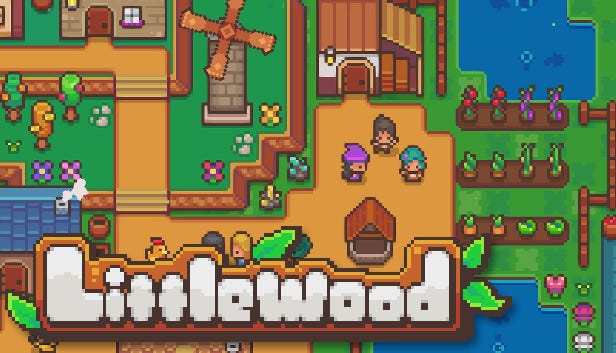Played for 91 hours (260 in-game days)
A couple weeks ago, shortly before Hurricane Beryl hit, I 100% completed a video game! That game is Littlewood, a pixelated RPG about rebuilding a town (called Littlewood, though you have the option to name it something else) created by sole developer Sean Young. Littlewood is actually what first made me consider buying a Steam Deck. The game was on sale for 50% off on Steam, but from let’s play videos I’d seen of it, it seemed like the kind of casual game better suited to a handheld device than a PC. I didn’t want to buy it for my Switch though, and so after a flurry of research, here we are!
The premise of Littlewood is you are the hero who has just saved the world from the Dark Wizard. However, the final battle left you with no memory of it or anything else from your past. Your two best friends and members of your adventuring party, Willow and Dalton, invite you to settle down in the empty town with them and restore it to its former glory. It’s an intriguing setup that leads into a relaxing gameplay loop of resource gathering, earning money, building structures in the town to attract NPCs, forming relationships with those NPCs, terraforming, and decorating.
The characters in Littlewood are fun. A total of 15 NPCs can eventually move into your town, some of whom require you to meet certain prerequisites first. There is a delightful mix of personalities, and everyone has amusing dialogue. As you grow in your friendship levels with the NPCs, you will unlock cute little cut-scenes that reveal the relationships and dynamics between certain characters. I like that the NPCs are further developed by each person having a list of decor preferences for their house that you are rewarded for helping them make a reality. I understand that some players will find this feature restrictive, since there are some items you can only unlock through fulfilling the NPCs’ preferences, but I like to have some limits in my games as opposed to complete freedom.
I think the feature that most differentiates Littlewood from similar games is the stamina system. In most life sim games, you have an in-game clock and a stamina meter. If you use up all your stamina but the day is not yet over, you are limited in what else you can do unless you eat food or otherwise replenish your energy. On the other hand, if the day ends, you are forced to sleep and start the next day regardless of how much stamina you still have. In Littlewood, the stamina and in-game clock are one. Time only moves forward when you take certain actions. That means you can stand around or do things that don’t require stamina (such as decorating or just walking around) for as long as you want. One reason I like this is that I tend to take time to ponder what I want to do next, and in most games I need to make sure I open a menu or otherwise ensure my game is paused, but Littlewood takes away that aspect of stress.
To be honest, Littlewood has a lot of grinding. However, for the most part, I actually enjoyed the grind and think it is a big part of what makes the game relaxing. In addition, the goals are realistic, all the actions you take contribute to your progress, and you eventually earn quality-of-life items and features that really help you out. For example, your tools are upgraded to be more efficient, you unlock statues that give perks, and you receive Jumpy Boots that let you move around much more efficiently. The coolest QOL item by far, though, is the Pocket Watch. One NPC foreshadows this item, which allows you to turn back time to the morning, effectively resetting your stamina, so you can accomplish more in one in-game day.
Overall, Littlewood is a cozy, casual game with plenty of heart and humor. The plot isn’t particularly deep, but the NPCs are thought-out and the gameplay is intuitive. And now, even after I’ve completed the game and the credits have rolled, I can still go back to my town to unwind and decorate.




